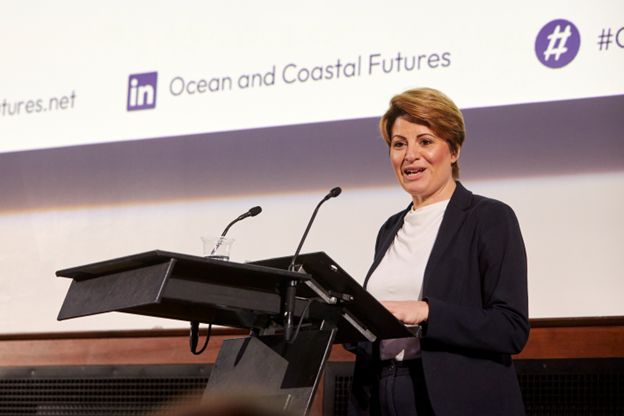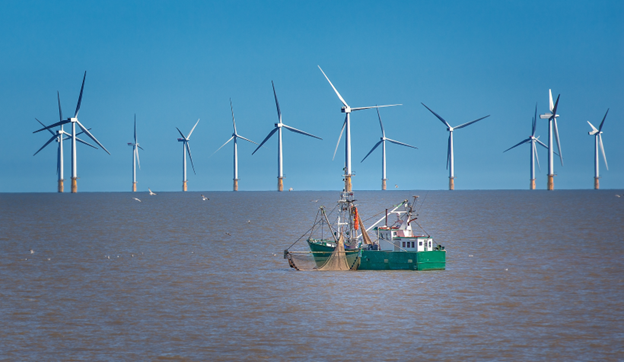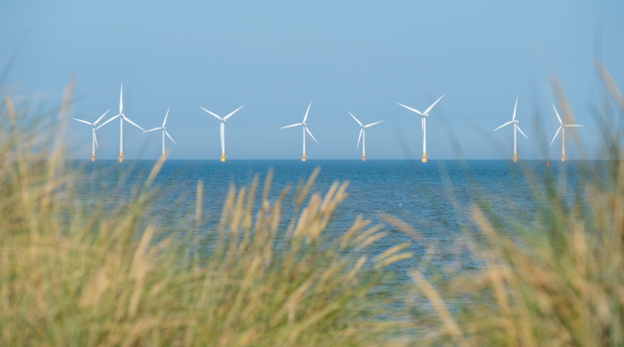Defra Minister, Emma Hardy MP, made a string of announcements at the recent Coastal Futures conference.
The Minister for Water and Flooding confirmed the Government’s position on accelerating offshore wind growth while announcing new proposals to protect and enhance the marine environment alongside energy development. She reiterated the point that the nature and climate change crises are of equal importance, and must be addressed together.
Designating new MPAs and extending existing MPAs
In her statement the Minister said: ‘Today I am announcing an action that my Department will take to help accelerate and de-risk the consent of offshore wind projects whilst continuing to protect the marine environment.
Multiple offshore wind projects are at risk because there are currently no ecologically effective options that developers can deliver themselves to compensate for their unavoidable impacts on seabed habitats within Special Areas of Conservation and Marine Conservation Zones. Without suitable measures, these projects cannot be delivered.
Defra commits to designating new MPAs and/or extending existing MPAs in Secretary of State waters to deliver sufficient strategic compensation to compensate for likely environmental effects of offshore wind development.
In all cases, MPA designations will be delivered by Defra. We anticipate that the total area of new and/or extended MPAs required to compensate for the predicted impacts of offshore wind projects will be small in comparison to the tranches of MPAs previously designated in Secretary of State waters. We will be looking to protect a range of benthic habitats.’
NGO hail “positive step”
Beccy Speight, RSPB chief executive, described the moves as a “positive step”.
She said: “Offshore wind is critical to addressing climate change and the announcement of new Marine Protected Areas is a positive step towards ensuring renewable energy doesn’t come at the cost of the marine environment.
“Minister Hardy’s speech today at the Coastal Futures conference recognised the UK’s seabirds face a barrage of pressures and that urgent action is needed to tackle devastating population declines, but progress at sea must go hand-in-hand with safeguarding and restoring nature on land.
“To provide investors with the certainty they need and avoid costly delays, the (forthcoming) Planning and Infrastructure Bill must deliver an improved system fit for purpose with a strategic approach to development that builds nature into decision making from the start, rather than pretending it’s a problem to simply be bulldozed out of the way.”
‘Marine spatial tensions’
The Minister continued, ‘We recognise that accelerating development of marine activities, and environmental protection and restoration measures such as the designation of new MPAs, is increasing marine spatial tensions. Though not caused by their actions, these competing priorities and demands for space present a challenge for the fishing industry, particularly as it is unlikely that it will be possible to avoid causing an impact on fishing activities in all cases.
Government will ensure that the [fishing] sector is supported to adapt to increased pressure on space. We will work with the industry to maintain its viability into the future and ensure it continues to make a significant contribution to coastal communities. The Government is committed to finding ways for different industries to co-exist and benefit from our marine space. We will also work with The Crown Estate and other relevant stakeholders to see how they can help in this process. Food security is national security, and a sustainable fishing industry is an important part of that.’
In response to the announcement of the proposed designation of new MPAs, the National Federation of Fishermen’s Organisations (NFFO) said in a statement: ‘Nothing, it seems will reduce the government’s enthusiasm for allowing foreign energy giants to build power stations in our waters. Instead, we will allow them to carry on as before, damaging the marine environment in one location, while pretending that this can somehow all be made better by ‘protecting’ the sea somewhere else.
Clearly, this announcement is just the start of a process and a lot is left unsaid. We do not know how large these MPAs will be; where they will be located; or exactly how they will be managed. The fact that fishermen are mentioned so explicitly in the Ministerial Statement is a worrying sign of how obviously our industry is in the firing line, but also a positive indicator of the government’s willingness to engage with us. Indeed, it is quite refreshing to hear politicians acknowledging that the decisions they are taking will impact the fishing industry.’
MPA network review
The Minister continued, ‘Alongside designating MPAs for benthic compensation, we will be undertaking a wider review of the MPA network and we will be keeping delivery of the MPA target under review with the aim of future-proofing the network, for example in terms of climate change adaptation and mitigation, while allowing us to still meet our international commitment to effectively protect 30% of our seas by 2030. A wider network review will also look to provide higher certainty for the fishing industry on the future MPA network.’
Environmental Improvement Package
In her statement, Minister Hardy said her department would implement an offshore wind environmental improvement package, of which recent and upcoming milestones include:
- underlining our commitment to use the powers conferred in the Energy Act 2023 to ensure that compensatory measures for unavoidable environmental impacts to Marine Protected Areas (MPAs) can be delivered strategically.
- publication of an updated Joint Position Statement on Unexploded Ordinance which sets out that low noise clearance should be the default in the marine environment.
- consulting on an offshore wind piling noise limit in the first half of 2025, followed by a pilot programme in 2025 and 2026.
- consulting in spring 2025 on reforms to the environmental compensation requirements for offshore wind projects with the aim to bring in legislation by Autumn 2025.
- the launch of a Marine Recovery Fund in late 2025 to provide an optional mechanism for developers to fund delivery of strategic compensatory measures.
Offshore wind industry welcomes Fund
The offshore wind industry welcomed the announcement of a Marine Recovery Fund, paid for by offshore wind developers, to enable more widespread measures to be taken to protect biodiversity in UK waters. The Offshore Wind Industry Council’s Workstream Sponsor for Environment & Consents Benj Sykes, Ørsted UK Country Manager, said: “[this] announcement is a welcome and much-anticipated step forward in the reform of our marine planning system to unlock government’s ambitious offshore wind growth targets whilst ensuring we continue to protect and restore our precious marine environment.
The Marine Recovery Fund is a vital tool in unlocking the pipeline of projects in development and we now need to build on the excellent collaboration between Defra, the Offshore Wind Industry Council and others to implement the fund as quickly as possible, and urgently expand the delivery of ornithological measures to protect seabirds, to avoid further delays to the progress of these projects, which are central to achieving the Government’s Clean Power 2030 Action Plan”.
The full statement from Minister Hardy can be found online and her opening address at Coastal Futures here.


